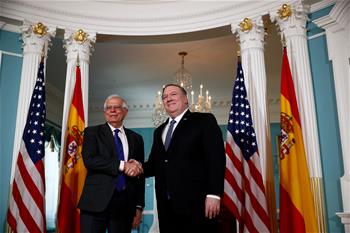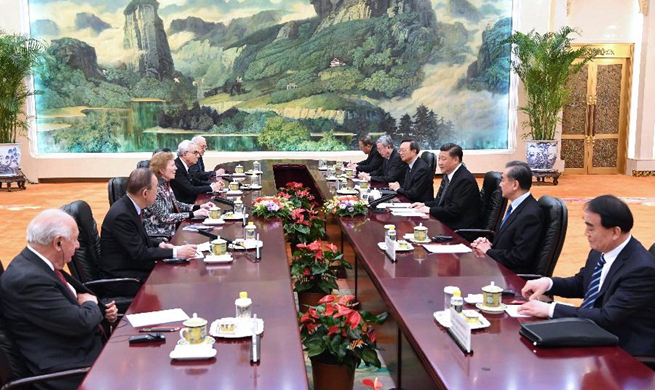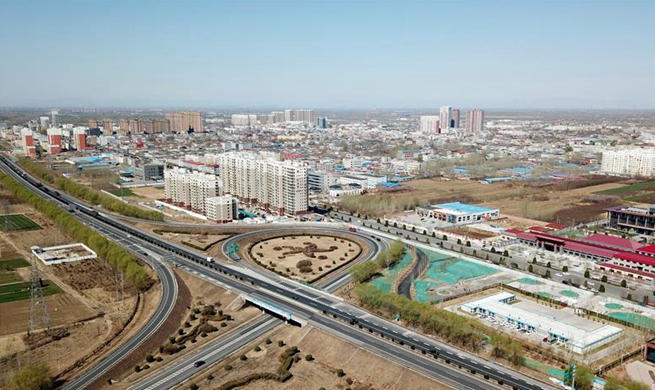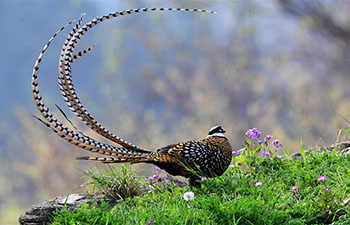by Xinhua writers Jin Jing, Gu Zhenqiu, Gui Tao
DERRY, Britain, April 3 (Xinhua) -- In a pair of black rubber boots that he usually wears while working on his muddy farm, 50-year-old Brian Renaghan strolled into a clear shallow stream, part of the Irish border that runs through his farm. In the blink of an eye, he stepped from the Republic of Ireland to Britain's Northern Ireland.
"After Brexit, that part of my farm will be EU (the European Union) and this part will be non-EU," Renaghan told Xinhua. "My farm may not be viable after Brexit," he said, with more than 100 cattle mooing and chewing hays not far from him.
CONCERNS OVER SUBSIDIES
Like many farms along the 500-km border between Northern Ireland and the Republic of Ireland, Renaghan's 200-acre farm is divided in two, one half in County Armagh in Northern Ireland, the other in County Monaghan in the Republic of Ireland. No sign of a border is visible, except the speed limit shown by miles in Northern Ireland and by kilometers in Ireland.
Renaghan's farm has been handed down for four generations. He claims 16,000 pounds (21,113 U.S. dollars) of EU subsidies each year to keep his business afloat. The EU's Common Agricultural Policy (CAP) system currently allocates some 3 billion pounds (3.96 billion U.S. dollars) a year to British farmers based on the amount of land they own.
"If the United Kingdom leaves the EU, I would lose about 10,000 pounds of subsidies (13,188 U.S. dollars) as the part of my farm in the UK will not be eligible for EU subsidies," Renaghan explained.
Without subsidies, Renaghan was worried that he cannot compete with the farmers in the EU or their counterparts in South America where hormones and disease control standards are different.
"That will lead to serious problems for me and viability of the farm," he said.
For farmers like Renaghan, it is extremely hard to plan or invest in the farm as Brexit uncertainty drags on.
The British parliament has rejected Prime Minister Theresa May's hard-brokered withdrawal agreement, for a third time since January, and has failed so far to agree on any other alternative plans. May announced Tuesday night that Britain needs a further extension of Article 50, which introduced a procedure for a member state to withdraw voluntarily from the EU, to ensure Britain to leave the EU with a deal, plunging the country into further uncertainty.
"There's nothing I can do. It's like you're fighting in the dark. You do not know what's happening," Renaghan said.
FEAR OF RETURN TO HORROR
Adding to Renaghan's concern is the possibility of a hard border right in the middle of his farm and returning to the time of horror on an island that was once plagued by bombings and gunshots.
"I still remember helicopters hovering over my head, army walking through the fields and people going through checkpoints to visit friends and families," Renaghan recalled the time of "The Troubles," three decades of late-20th-century sectarian terror between the north and the south that took more than 3,000 lives.
The Good Friday Agreement of 1998 ended "The Troubles," secured the peace, while essentially erasing the border between the Republic of Ireland and Northern Ireland.
But now the peace process could be "hijacked" by politicians in Westminster because of "an internal feud," Renaghan said.
"For 20 years we've had peace, prosperity, relative prosperity in this country. And they are putting that all at risk," Renaghan said, while pointing at the border areas where barbed wires used to be in place.
"The backstop is essential," said Renaghan, referring to a key part of the Brexit deal that seeks to avoid a hard border between Northern Ireland and Ireland and keeps the free movement of goods and people after Brexit.
"It was always a constant fear, a constant fear that things could happen. I don't ever want my kids to see that," he said.
SENSIBLE MINDS URGED
The Irish backstop has been the sticking point in Theresa May's Brexit deal. Hardcore Brexiteers fear that the backstop will trap Northern Ireland and thus Britain in the EU, threaten the country's integrity and compromise its right to strike trade deals with third parties.
To win over the members of parliament, May had managed to win concessions from the EU that the backstop will only be temporary if it ever comes into force. However, British Attorney General Geoffrey Cox believed that the revised divorce deal had not given Britain legal means of exiting the backstop arrangement unilaterally if "intractable differences" arose, causing the rejection of the deal by the parliament.
Professor Thom Brooks, a leading expert in immigration law and policy, told Xinhua that May's Brexit deal seems to doom to fail with a "fundamental tension between the desire to have greater control over the border, yet allowing a complete total open border for part of the country."
"I haven't heard a good explanation from anyone ... as to how Britain can get greater border security as a sovereign country outside the EU, but with a complete open border with a country that is no longer aligned with Britain," said Brooks, dean at Durham University's Law School.
Politics aside, farmers like Renaghan care the most about the food on the table and peace and quiet that they have finally enjoyed after decades of conflicts. In the 2016 referendum, the majority of Northern Ireland voted to remain in the EU.
"I hope that sensible heads will prevail. People's livelihoods and the peace process are at risk," Renaghan said.













